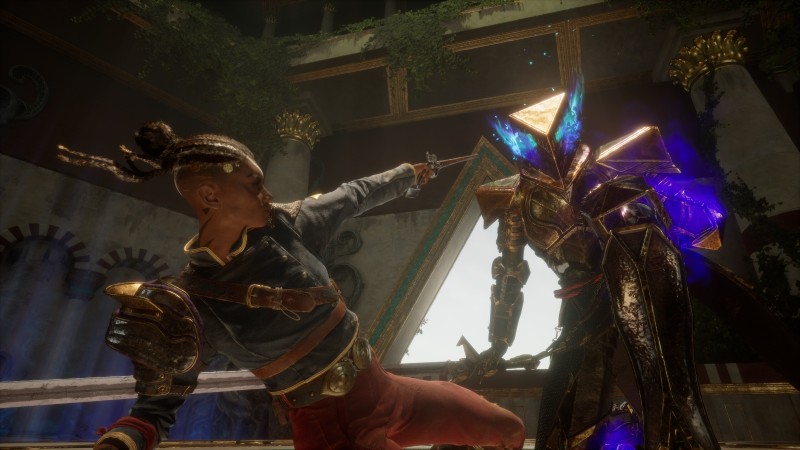Flintlock: The Siege of Dawn does its best to provide an epic adventure despite clear limitations. This semi-open world action game’s bright spots include an exciting premise, a unique tag-team spin on Souls-inspired combat, and an entertaining exploration mechanic. Unfortunately, it falls short of providing a wholly satisfying or polished adventure, resulting in a respectable but flawed revenge quest.
Developer A44 has crafted an intriguing world that blends a colonial aesthetic and technology (think 18th or 19th century) with magic and fantastical creatures. Soldier Nor Vanek embarks on a mission to kill all gods after they and their armies of the dead have broken into the mortal realm. She finds an unlikely ally in Enki, a small fox-like deity with mysterious reasons for helping Nor slay his kin.
As the two gather a small band of allies to take on their divine foes, Flintlock spins an adequate yarn backed by stronger performances. Meaningful character development could be more consistent, however. While the evolution of Nor and Enki’s uneasy partnership feels largely earned with a few decent revelations, the rest of the supporting cast doesn’t get the same love, making it hard to care about them. The pantheon of primary antagonists feel equally uninteresting, as little time is spent establishing their personalities or purpose in this world; they’re just cool-looking punching bags who occasionally taunt players en route to them. When I did find the narrative interesting, uneven sound mixing meant that the soundtrack often muffled dialogue.
Flintlock’s combat consists of decent melee combat emphasizing small combos while keeping distant foes at bay using a range of firearms. Hacking away at foes using Nor’s axe feels passable at best. Parrying feels equally mediocre and occasionally unreliable due to questionable timing windows that are tricky to nail even hours deep into the adventure. The action functionally works, but a thin layer of jank holds it back, including dumb-as-rocks enemies that often won’t detect you even when passing well within their view.
Hitting a button allows Enki to lend a hand by bestowing debilitating curses that weaken, stun, or poison targets. It’s a neat assist that bears greater fruit after unlocking several cool upgrades. Eventually, Enki can restrain or distract enemies, imbue your melee weapons with his power, and curse multiple foes simultaneously, among other valuable abilities. Firing Nor’s pistol from the hip to interrupt or counter an assault is a fun strategy that made it my favorite sidearm. Other ranged weapons, such as a rifle, grenade launcher, or flamethrower, don’t stand out or feel good enough to encourage regular use.
Though described as a Souls-lite and sporting familiar genre tropes, such as having to retrieve lost experience points (called Reputation) upon death, I wouldn’t call Flintlock a challenging game. Most threats can be torn right through, and none of the boss fights took more than a few attempts; the final boss, most surprisingly, is the biggest pushover of the bunch. The most interesting and effective combat twist is an experience points multiplier that builds as you execute different attacks and actions, encouraging players to creatively vary their assaults. The catch is you must manually add these points to your XP pool by holding a d-pad button; if you don’t, taking damage resets the counter to zero, meaning you can finish a full encounter and walk away with little to show for it (though bigger enemies still drop a guaranteed large amount of XP). I like how this system added more tension and intentionality to combat.
Flintlock mostly unfolds across two medium-sized landmasses sporting a small number of boilerplate sidequests (with worthwhile rewards) and collectibles such as various XP and upgrade items and lore notes. It’s not the most thrilling world to explore, save for an unlockable network of magic warp points called Rifts that let players soar through the sky to expedite travel. Rifts serve as great shortcuts and sometimes create fun platforming segments, making them one of my favorite mechanics in the game.
Flintlock’s presentation is nothing to write home about, with only a few creative creature designs piquing my interest. With two graphical options, you’re better off sticking with the default Performance mode, as Quality offers a negligible bump. Animations can be stilted and sometimes have an unfinished quality, such as the bad-looking slow-motion kill cam that saps the satisfaction from rifle headshots.
Despite my hangups, Flintlock: The Siege of Dawn never plummets to being actively bad. Instead, it coasts along a solid line of mediocrity that results in a moderately good time. It often feels like it wants to say or do more but is held back by its scope and execution, not to mention some technical hiccups. Though it occasionally shows flashes of brilliance, Flintlock: The Siege of Dawn falls short of achieving true godhood.
